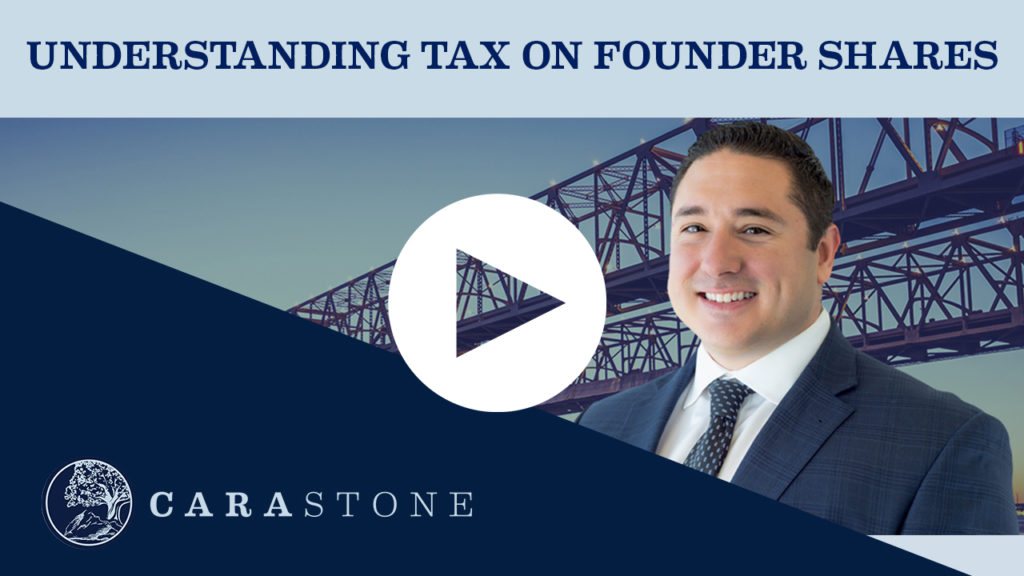Tax on Founder Shares Explained
Disclaimer: This post discusses general legal issues, but it does not constitute legal advice in any respect. This post is not a substitute for legal advice and is intended to generate discussion of various issues. No reader should act or refrain from acting on the basis of any information presented herein without seeking the advice of counsel. Cara Stone, LLP. and the author expressly disclaims all liability in respect of any actions taken or not taken based on any contents of this post. The views expressed herein are personal opinion.
It is common practice for founders to take shares in their company. When it comes to structuring those shares, it is important for founders to take certain steps to avoid costly taxes. So, how will a founder be taxed on the issuance of shares of the company? Put simply, if the value of the shares the founder receives exceeds the amount of money that he/she pays for that that stock or those shares, the founder will have taxable income equal to that difference.
For example, let’s say the founder is receiving two shares of stock in a corporation. The value of those two shares in the market is $2, so the fair market value is $2. The founder will have zero income tax if he/she pays the corporation issuing the stock $2.
If, on the other hand, the founder pays $0 in cash and he/she performs a service is for the stock, then he/she will have $2 worth of income.
A lot of founders get this wrong. It’s a common misconception that a founder does not have to put in any cash for shares in their company. Instead, they structure their stock in exchange for sweat equity.
The problem from the IRS’ viewpoint is that the value of the founder’s sweat equity has no cash basis. If a founder hasn’t put any cash value into their stock, then the stock they receive will be viewed as income. From that perspective, it’s important that founders find a fair market value for the stock, set the price, and then pay that price.
We will cover in other posts how to set fair market value and how to arrive at that determination. The key point to take away from this post is if there is if no cash has been put into shares at the founder level, the founder could have tax consequences down the road.
We’ve also discussed founder taxes in a quick video here – https://www.youtube.com/watch?v=iq8r8TQIi5M&t=12s
Other Articles You May Be Interested In:
Preparing for Exit Part 1
Equity Incentives For LLCs
Disclaimer: This post discusses general legal issues, but it does not constitute legal advice in any respect. This post is not a substitute for legal advice and is intended to generate discussion of various issues. No reader should act or refrain from acting on the basis of any information presented herein without seeking the advice of counsel. Cara Stone, LLP. and the author expressly disclaims all liability in respect of any actions taken or not taken based on any contents of this post. The views expressed herein are personal opinion.
It is common practice for founders to take shares in their company. When it comes to structuring those shares, it is important for founders to take certain steps to avoid costly taxes. So, how will a founder be taxed on the issuance of shares of the company? Put simply, if the value of the shares the founder receives exceeds the amount of money that he/she pays for that that stock or those shares, the founder will have taxable income equal to that difference.
For example, let’s say the founder is receiving two shares of stock in a corporation. The value of those two shares in the market is $2, so the fair market value is $2. The founder will have zero income tax if he/she pays the corporation issuing the stock $2.
If, on the other hand, the founder pays $0 in cash and he/she performs a service is for the stock, then he/she will have $2 worth of income.
A lot of founders get this wrong. It’s a common misconception that a founder does not have to put in any cash for shares in their company. Instead, they structure their stock in exchange for sweat equity.
The problem from the IRS’ viewpoint is that the value of the founder’s sweat equity has no cash basis. If a founder hasn’t put any cash value into their stock, then the stock they receive will be viewed as income. From that perspective, it’s important that founders find a fair market value for the stock, set the price, and then pay that price.
We will cover in other posts how to set fair market value and how to arrive at that determination. The key point to take away from this post is if there is if no cash has been put into shares at the founder level, the founder could have tax consequences down the road.
We’ve also discussed founder taxes in a quick video here – https://www.youtube.com/watch?v=iq8r8TQIi5M&t=12s
Other Articles You May Be Interested In:
Preparing for Exit Part 1
Equity Incentives For LLCs

























